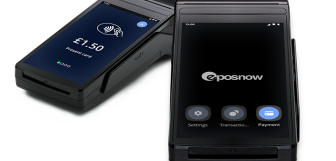What is the best card machine for small business?
You’d be surprised how often a dodgy card machine gets in the way of great service and easy sales. And when you’re running a small business, every second, and every swipe, counts. That’s why today, we’re cutting through the noise and answering one big question:
What’s the best card machine for small business?
We'll walk you through the different types of card machines out there, cover the key features that make a real difference and finally break down the cost - because yes, it needs to work well, but it also needs to make sense for your bottom line.
By the end, you’ll know exactly what to look for and what to avoid, so your card machine can keep up with your business, not slow it down.
Why card machines are essential for UK small businesses
Let’s break down exactly why card machines are such a must-have for small businesses across the UK.
The rise of card payments and mobile wallets
Cash is no longer king. In fact, these days, it’s more like a backup plan. Don't just take our word for it though. According to a new study by LINK, the amount of cash withdrawn from ATMs across the UK in 2025 is 31% lower than six years ago in 2019. Card payments now account for around 85% of all UK transactions. Card payments and mobile wallets have taken over because they're fast, easy, and completely expected by customers.
Meeting customer expectations: contactless, Apple Pay, Google Pay, and Samsung Pay
No one wants to dig around for coins or wait while a card reader struggles to connect. Customers want to tap, pay, and move on. After all, if you've only got an hour lunch break, you wouldn't be thrilled to spend a large fraction of that time at a counter. That means your machine needs to accept everything. Contactless cards, Apple Pay, Google Pay, even Samsung Pay need to be involved. If you can’t take the payment method they prefer, you risk losing the sale.
The role of card machines in modern payment processing
Today’s card machines do way more than just take payments. They connect with your point of sale (POS) system, track your daily totals, and help you keep your records clean. Some even send digital receipts and sync with your accounting software.
They're faster, smarter, and far more efficient than handling cash. Less room for error. Less time counting coins. More time doing what you actually care about, running that brilliant small business of yours.
Understanding your business needs first
Before you pick a card machine, you need to think about how your business actually runs day to day. Card machines comes in all shapes and sizes, they don't all run the same. The best one for you depends on a few key things:
Fixed vs mobile operations
Are you based in one spot like a café, salon, or shop? Or do you move around? Maybe you’re a market trader, food truck owner, or run fun, fashionable popup events? If you’re fixed, a countertop machine that plugs in might do the job. But if you're on the go, you’ll need something wireless and portable. Mobile card machines or portable card readers connect via 4G, Wi-Fi, or Bluetooth. That means you'll always be able to accept payments on the go. So, Fixed terminals are suitable for retail stores, while portable card readers are ideal for mobile and small businesses.
Customer interaction flow
Think about how your customers pay. Do they come to a counter? Do you take payments at the table or while walking the shop floor? The layout of your space and how you serve customers will affect which machine works best. You want a setup that keeps things smooth, fast, and friendly, not one that has you running back and forth or reaching over tables.
Sales volume and transaction frequency
If you’re taking dozens of payments an hour, you need a machine that can keep up. A lower volume on the other hand might not need all the bells and whistles. But you still want something that won’t freeze or slow you down.
Need for digital receipts and business analytics
If you want to email receipts to customers, track sales trends, see your best-selling items or busiest times, you're not alone. These are all pretty usual and common requirements for small business owners like yourself. Now, with that in mind, some card machines do way more than just payments. They offer built-in reports and analytics that help you understand your business better.
Types of card machines explained
Once you know how your business operates, it’s easier to pick the right card machine. There are three main types, each designed for different setups.
Countertop card machines for static environments
Perfect for: shops, salons, cafés, and anywhere you take payments in one spot.
Countertop card machines stay plugged and connect via broadband or a phone line.
Portable card machines for table service or shop floor payments
Great for: restaurants, pubs, and retail stores with large floors or customer seating.
These machines work over Bluetooth or Wi-Fi and come with a charging base. You can carry them around and take payments at tables, fitting rooms, or anywhere your customer is.
Mobile card machines with free unlimited mobile data for on-the-go sales
Fab for: market stalls, food trucks, pop-ups, delivery services, and mobile trades.
Mobile card machines are fully wireless and often come with built-in 4G and unlimited mobile data. That means you can take contactless payments literally anywhere, no Wi-Fi needed.
Key features to look for in a card machine
To get the most out of your new card machine, there's a few features you’ll want to make sure it ticks off.
Chip and PIN and contactless functionality
You need both. Some customers still prefer to pop in their PIN, while most will want to tap and go.
Support for credit and debit cards
Most card payment machines accept payments from major card issuers like Visa and Mastercard. Make sure your machine accepts all the big names - your Visas, Mastercards, Amex's, and Maestros. It's 2025 and you really shouldn't be answering no to the "Do you accept Amex" question anymore.
Compatibility with Apple Pay, Google Pay, Samsung Pay
More and more people are ditching wallets altogether and paying with their phones or smartwatches. Your card machine needs to support mobile wallets, no exceptions.
Digital receipts and email/SMS capabilities
Paper receipts are becoming old news. Plus they're not ideal for the environment and we all want to be pro planet. A good card machine should give customers the option of a digital receipt, sent straight to their email or phone.
Integration with POS and business systems
Want your sales, stock, and reports to sync automatically? Then choose a card machine that plays nicely with your point-of-sale system. If you haven't yet invested into a retail POS system or hospitality POS system for your business, ours work really well with others. We're integration pros.
Cost factors to consider
Finding the right card machine isn’t just about features. There are a few key costs to look out for before you commit.
Card machine cost (upfront or rental)
Some machines come with a one-time purchase price. Others you can rent for a monthly fee. Buying might save money in the long run, but rental often includes tech support, software updates, and replacements. It all depends on your setup and how long you plan to use it.
Monthly fees and contracts
Some providers offer flexible, rolling plans. Others lock you into long contracts - sometimes for 12, 24, or even 36 months. Be clear on what you’re signing up for. And make sure you know exactly what that monthly fee covers. Sometimes it’s just the machine, others it includes extras.
Competitive transaction fees and merchant account costs
Every time you take a payment, a small cut goes to your payment provider. These are called transaction fees, and they change depending on things like your provider, sales volume, and the type of card used.
On top of that, you might also pay merchant account fees. This is the account where card payments are held before being transferred to your bank. Some providers bundle this with your setup, while others charge separately.
Optional add-ons and hidden charges to watch for
Tipping options, printed receipts, extra user accounts, some features cost extra. And don’t forget the sneaky stuff like early cancellation fees, PCI compliance costs, even charges for tech support.
Ensuring secure and compliant transactions
A secure setup builds trust, protects your business, and keeps you on the right side of the law.
PCI compliance and fraud prevention
If you accept card payments, you need to follow PCI DSS (Payment Card Industry Data Security Standard). It sounds technical, but it’s basically a checklist to keep card details safe.
Encryption and tokenization
Every time a payment is made, the data should be encrypted (which essentially just means turned into a secure code) so no one else can read it.
Tokenization is even better. This replaces card details with random codes (tokens), so your system never stores sensitive data. It’s one of the safest ways to process payments and a must-have feature.
Customer data privacy
Your customers trust you with their card details, so you need to handle that info responsibly. That means using secure systems, never storing data unnecessarily, and following GDPR rules.
Ready to take payments anywhere?
Epos Now Payments Lite is more than just a portable card machine with a built-in receipt printer—it lets you trade wherever you are on WiFi, with 4G or in Offline Mode.
Choosing the best card machine for your business model
Not all businesses work the same way, and your card machine should match how you operate day to day. Here’s what to look for based on your industry or setup:
For hospitality: table service, speed, and tips
- Portable card machine that works anywhere on your hotel or restaurant premises
- Fast processing for quick table turnover
- Easy tipping options for customers
- Ability to split bills or accept multiple payment methods
For retail: integration with inventory and receipts
- Integration with your POS system to sync sales and stock
- Payment API integration
- Digital and/or printed receipt options
- Fast checkout to reduce queues
- User-friendly interface for staff
For mobile services: free unlimited mobile data and battery life
- Mobile card machine with built-in SIM and unlimited 4G data
- Long battery life for all-day use on the go
- Compact and durable design
- Works anywhere, no Wi-Fi needed
For seasonal businesses: no long-term monthly contracts
- No tie-in contracts or long-term commitments
- Pay-as-you-go pricing or flexible monthly options
- Quick setup and easy storage when not in use
- Affordable rates for lower transaction volumes
How Epos Now supports small business owners with card payments
At Epos Now, we’re here to make payment processing easy, reliable, and tailored to how you work. Here's how we do that:
Flexible contracts
Whether you’re running a busy café, a boutique shop, or a mobile service, we offer flexible contracts that suit your setup meaning no long-term tie-ins unless you want them.
All-in-one POS + payment solutions
Our all-in-one POS and payment solutions keep everything in sync, from taking payments to tracking sales and stock. It’s faster, smoother, and built to reduce errors and save you time.
Reliable payment processing and UK-based support
When it comes to reliability, we don’t cut corners. Our payment processing is fast and secure, with full PCI compliance and built-in fraud protection. And if you ever need help, our UK-based support team is ready to jump in.
Scalable options for growing businesses
As your business grows, we grow with you. You can easily scale your setup—add more tills, card machines, or locations without the fuss. With built-in analytics and real-time reporting, we give you the insights you need to keep moving forward.
We're more than a provider—, we're your payment partner.
Conclusion: Finding the right fit for your needs
So, what’s the best card machine for a small business? Well—it depends. It’s not just about picking the cheapest option or the flashiest one. It’s about finding the right fit. The one that works with the way you run things, helps you move faster, keeps your customers happy, and grows with you.
Think beyond just price – think fit, function, and future
Price matters, sure. But so does function—and so does the future. Think about how you take payments today and how you want to do it next year. The right solution should support both.
Why small business owners choose integrated solutions
That’s exactly why so many small business owners choose integrated systems like ours at Epos Now. It’s not just a card machine - it’s your payments, sales, stock, and reporting all working together in one place. Simple, smart, and designed to help you focus on what matters most: running your business.
Here’s to making payments that work for you, not against you.
- What is the best type of card reader for small business?
-
The best card machine for small businesses depends on how and where you work. If you’re always on the move, go for a mobile credit card machine with free unlimited mobile data. If you’re working from a counter, a countertop card reader might be best. Portable card machines are great if you need to take payments at the table or around your store. Look for key features like chip and PIN, contactless payments, and support for Apple Pay, Google Pay, and Samsung Pay.
- How much does a payment machine for small business cost?
-
Card machine cost can vary. Upfront costs for card machines can range from £0 to hundreds of pounds depending on the device and ongoing charges. You might choose to buy outright or go for a rental with monthly fees. Monthly fees may apply for card machine services, but pay-as-you-go options typically come with higher transaction charges. Don’t forget to factor in competitive transaction fees and any optional add-ons too. Transaction fees typically range between 1.5% and 2% of the transaction value.
- Can I use a card reader without a business account?
-
In most cases, you’ll need a business or merchant account to accept card payments. This is where your customer payments get processed before hitting your bank account. Without it, you can’t accept credit and debit cards properly—and you might run into higher merchant account fees.
- What payment methods should a modern card machine accept?
-
A modern card machine should accept all the major payment methods. That includes chip and PIN, contactless payments, mobile wallets like Apple Pay, Google Pay, and Samsung Pay, plus all major credit and debit cards. The more ways you can accept payments, the better the experience for your customers.
- Are portable card machines reliable for contactless payments?
-
Yes, a portable card reader is great for fast, reliable contactless payments. Nearly all modern card payment machines support contactless payments, in fact. They’re ideal for shops, cafés, or restaurants where you need to move around but still want smooth payment processing. Just make sure your Wi-Fi or data connection is solid.
- What is the difference between mobile and countertop card machines?
-
Mobile card machines are wireless and usually come with free unlimited mobile data, so you can take payments anywhere. Countertop card machines stay in one place and connect via broadband, making them better for fixed till points in shops or salons.
- Do I need a merchant account to accept credit and debit cards?
-
Yes, you’ll need a merchant account to accept payments from credit and debit cards. It’s how your card payments are securely processed before they land in your business bank account. Some providers bundle this in with your card machine setup to make life easier.
- Are digital receipts better for small businesses than paper receipts?
-
Digital ones are quicker, eco-friendlier, and easier to manage. You can send them via email or SMS, and they’re great for building customer loyalty too.
- How do I ensure secure transactions with a card machine?
-
Choose a card machine that offers encrypted payment processing, PCI compliance, and fraud protection. Features like tokenisation and secure mobile wallets (Apple Pay, Google Pay, Samsung Pay) help protect both you and your customers during every transaction.
- What are the ongoing costs of using a card machine?
-
Ongoing costs include monthly contracts, card machine rental or service fees, and competitive transaction fees per sale. You’ll also want to watch out for hidden charges like optional add-ons or higher rates for certain payment methods. Always check what’s included before you commit.



